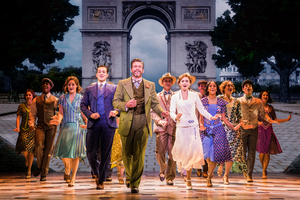Review: ANASTASIA Dazzles While Drawing Comparisons For Fans Of The 1997 Film

From the regal shimmer of tsarist Russia circa 1917 to the gloom of post-revolution St. Petersburg to Paris in all its 1927 effervescence, Anastasia is indeed a journey to the past. But it's not quite the same past that fans of the 1997 animated film have come to adore with cultish fervor. If you've come for Rasputin in all his comic-bad-guy glory, be warned: he's not here. Not even a mention. That goes double for talking bats.
This Anastasia is much more rooted in reality. In brief, how in the final days of Imperial Russia, revolutionists captured the entire Romanov family -- Tsar Nicholas II, Tsarina Alexandra, and their five children -- and shot them dead. There really were rumors that the youngest daughter, Anastasia, somehow survived. People love an urban legend. Our collective intrigue over this young princess and the fantasy of her escape has manifested in movies and stage productions that continue to feed our fascination. Even without Rasputin, the Romanovs' creepy spiritual advisor and arguably one of the most chilling chapters in their family biography, there's ample history to support a Broadway musical.
So why does it feel like there are some loose threads in Anastasia and a bit of an identity crisis? This is a show that leaves one wondering whether its creators hoped to drive home history, revolution, and the aftermath of tragedy, or a princess story and fairytale romance. Not saying both can't be achieved, but if you have to ask the question in the first place, that says something.
Being a devotee of the 1997 film myself, I recognize my own bias. Yet I feel it's safe to say that the weakest link in Anastasia's stage story is the villain, Gleb. Instead of a snarling Rasputin, we're given a soviet police inspector that's so Javert-lite, the best thing about his character is to pick out the similarities: sung inner monologues, a sense of duty, a crisis of conscience, even the cadence of his songs and vocal tone. As the touring Gleb, Jason Michael Evans has a lovely voice to be sure, but the character itself feels underdeveloped and too derivative to leave a lasting impression.
The existence of Gleb points to an Anastasia leaning into reality more than fantasy. Just as there's no undead Rasputin with a batty sidekick, the on-stage Anya (Anastasia) is much more raw and real. She's zapped of her animated character's humor and lightness, as well as her playful, sarcastic rapport with love interest Dmitry. Instead, Anya is portrayed as a girl who has lived a tragedy -- a little glum, but a fighter, brave and bold.
Given the horrors she's endured, I can see why the show's creators chose to give Anya more realistic emotions at the onset. Yet despite this critical change in tone for our titular character, her story's final chapter ends up the same as in the animated film. I'm all for a fairytale ending, but this Anastasia was not really set up to be a fairytale -- rather, a historical fiction. Hence the disconnect.
For all my quibbles and overthinking of character development and motivation, Anastasia is certainly an entertaining night of theater. Dazzling costumes range from twirling, glittering royal garb to the lush, flirty sparkle of 1920s Paris. It's all so divine, you quickly forget about all those drab Russian rags worn in the bulk of Act One. When it comes to choreography, dancing happens in the palace and in Paris -- a purposeful choice to exclude post-revolution Russia from all joy, perhaps. A special moment comes when our protagonists attend the Russian Ballet and we're treated to a snippet of Swan Lake as a ballet-within-a-play.
The sets are, for the most part, rendered through digital effects. Skyscraping screens depict everything from the imperial palace ablaze to lightly-falling snow to the streets of St. Petersburg and Paris. Many times the images on the screens rise and fall like physical set pieces would, and their digital nature allows for visuals to flow between scenes for quick, seamless transitions.
Last but certainly not least, this touring cast deserves the highest of praise. Lila Coogan's Anya has a pristine, powerful singing voice and plenty of spunk. Our Dmitry on opening night was understudy Matt Rosell -- solid vocals and adorable to boot. As Anya's grandmother the Dowager Empress, Joy Franz repeatedly tugs at emotional heartstrings. She's simply wonderful. Most outstanding is Edward Staudenmayer as Vlad, Dmitry's cohort. His voice is next-level greatness, and his presence lends a lightness of spirit to the stage. As Vlad's romantic interest, Countess Lily, Tari Kelly lights up her scenes with humor and huge vocals. She's just plain fun, and she and Staudenmayer together are stand-out favorites.
As the curtain fell, I was struck with mixed emotions. This Anastasia is impeccably performed, gorgeously rendered, and entertaining to be sure. Still, to me, the new songs don't soar alongside the old ones. I wonder how I'd feel if I didn't already know those old songs by heart. That's the risk the show's creators took in translating Anastasia for Broadway. The question, in the end, is whether or not they improved upon the source material and made this new journey worth everyone's while. Fans of the film, go and see for yourself. See if you can hear the ode to "In the Dark of the Night." Sigh over Anya's signature blue evening gown. Swoon a little over Dmitry. Then come find me. We've got a lot to talk about.
Reader Reviews
Videos

